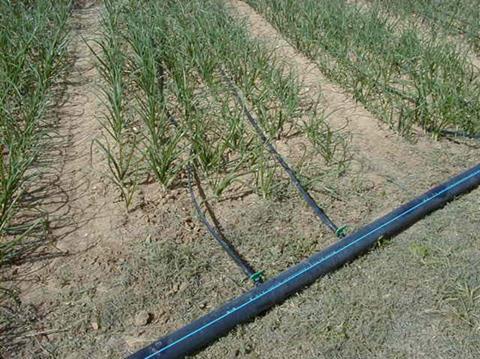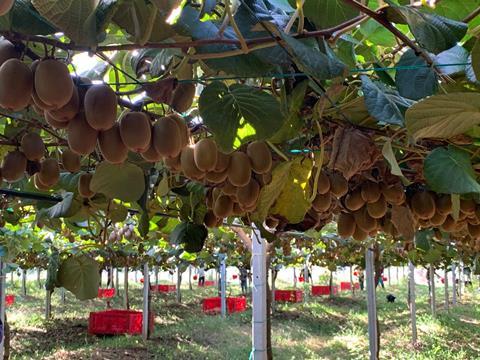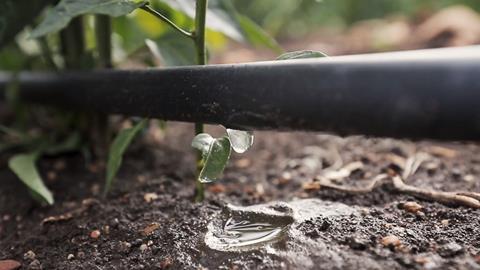Thirty per cent less water to produce kiwifruit, 20 per cent less for industrial tomatoes, with 50 per cent less emissions: Europe’s fruit and vegetable industry remains committed to safeguarding the planet’s most precious resource

”Accelerating change to solve the water crisis”: this is the challenge launched by World Water Day 2023. An objective that underpins many others: reducing waste, optimising the use of the planet’s most precious resource and implementing all measures that can help quench the “thirst” of the Earth and its inhabitants.
A challenge that the European fruit and vegetable sector, promoted by In&Out, has risen to for some time now, with significant results. In&Out is a project co-funded by the European Union to promote the value of national and regional fruit and veg supply chains, particularly those that involve producer’organisations.
Latest research shows that, thanks to innovative technologies and new agronomic techniques, today we produce more and with less water: 30 per cent less in the case of kiwifruit, and up to 20 per cent less for processed tomatoes, the basis of a supply chain that produces widely consumed products such as pastes, sauces and purées, and a tangible sign of the commitment to tackling the water crisis.
“Fruit and vegetables producers optimise the use of water and do not waste it, as some biased narratives attempt to tell the consumer,” comments Davide Vernocchi, president of Apo Conerpo, the largest fruit and vegetable producer organisation in the EU and promoter of the In&Out project.
“When we involve ourselves with the natural water cycle, from the source to the sea, by drawing water to irrigate fields and orchards, we are well aware of the responsibility we are assuming, particularly at a time in history like the present, when drought is a threat to the entire planet.
”We are convinced, however, that every drop of water that is transformed into good, healthy and wholesome fruit and vegetables is not wasted but, on the contrary, contributes to the well-being of the Earth and those who inhabit it. Hence our twofold commitment: to make the best use of only the water strictly necessary and to continue investing in research and technological development to provide farmers with solutions that enable them to produce in an increasingly sustainable way.”
On the right track

And the results show that the path embarked upon is the right one. “For more than a decade, Apo Conerpo has been promoting the spread of increasingly precise and effective irrigation and fertirrigation systems among its member farms: a win-win decision also from the production point of view, since studies have shown that excessive water supply is just as damaging as drought,” Vernocchi continues.
“Take, for example, two crops that, in the collective imagination, are perceived as particularly water-greedy: tomatoes and kiwifruit. For the former, via two major research projects, LCA and LIFE Climate ChangER, we have shown how switching from irrigation with classic ‘large irrigation rolls’ to irrigation with hoses makes it possible to reduce water use by up to a fifth in the production of industrial varieties, those that will become the sauces and sauces that end up on the tables of millions of Italians every day, and the percentage rises to 30 per cent with other vegetables.”
But that is not all, he adds. “By using hoses for fertigation, that is, the distribution of fertilisers together with water, our producers have managed to significantly increase production yields per hectare while decreasing CO2 emissions into the atmosphere. Irrigation, we should not forget, requires energy to operate: a reduction of up to 50 per cent has been recorded compared to the emissions produced by classic irrigation and fertilisation techniques. In essence: less water and less carbon dioxide for an increasingly planet-friendly industrial tomato.”
There are also impressive outcomes for kiwifruit production. “Thanks to the use of sensors in the soil that measure the moisture content, with high-precision systems it is possible to obtain the optimum moisture content for the plant by administering only the water necessary at the precise point where it is needed. Thus, in kiwifruit today, 30 per cent less water is used than just a few years ago, reducing the energy needed for irrigation by over two-thirds. Thanks to this innovation, over 1,500 cubic metres of water are saved per hectare of kiwifruit per year without affecting the quality, taste or wholesomeness of the fruit.”
To find out more about Apo Conerpo’s commitment to water saving, visit the In&Out project website: www.ineout.eu





